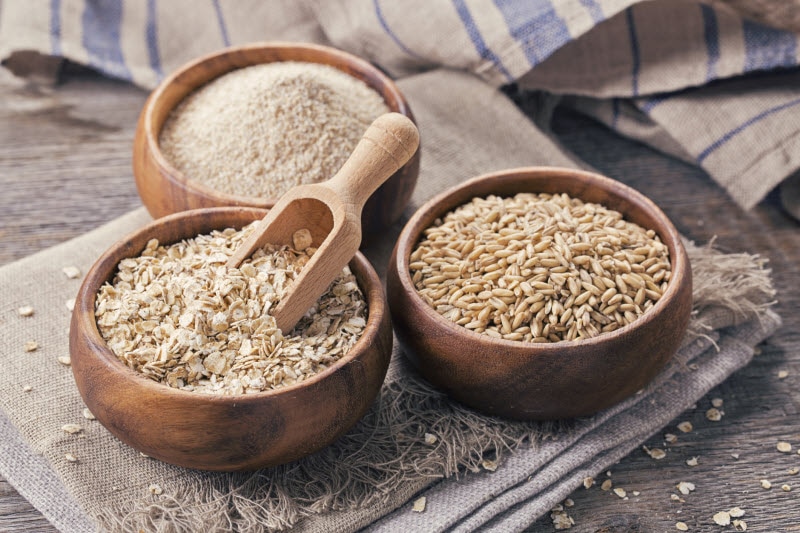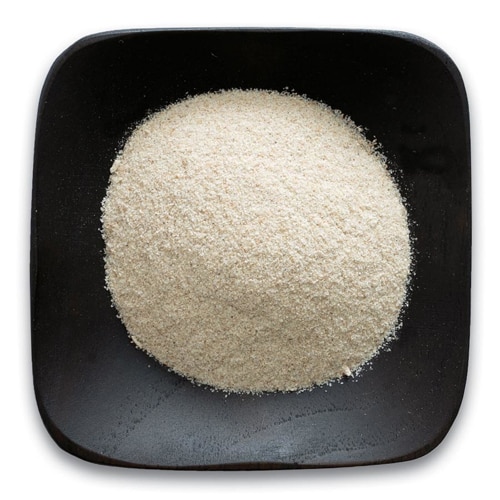[vc_row][vc_column][vc_column_text]
Fiber may not have the powerhouse reputation of protein or the allure of healthy fats—hello, almonds and avocados—and yet it’s one of the most important nutrients you need for optimal health.
From promoting sound digestion to staving off dips in your blood sugar, this often-overlooked essential is crucial towards feeling, and looking, your best.
†

And while you may recall the basics of fiber and the difference between soluble and insoluble types, you may not have as clear of a picture on the myriad
forms of fiber that exist—or how they can help you thrive. This is imperative, as the National Institutes of Health reports that as few as
5% of the U.S. population eats the recommended amount of fiber (25-30 grams per day).
This guide on fiber is here to assist. Keep reading as we peel back the layers on this indispensable nutrient and how it can help ignite an energized life.
†
Remind me: What is fiber again?
Consider fiber the glue that holds plants and grains together. Found in a variety of foods like oats, berries, artichokes and okra, it’s divided into two categories: Soluble and insoluble. The former breaks down in water; the latter does not. Both have specific tasks within the body, namely:
- Soluble fiber forms a gel upon consumption that aids in satiation by slowing the process of digestion, while
- Insoluble fiber acts as a magnet for water, which it pulls into your stools and renders them easier to pass.
One isn’t better than the other; rather, you need
both for wellness. All the while, fiber—whether insoluble or soluble—offers a host of marvelous benefits.
What are the benefits of fiber?
Fiber provides a cornucopia of advantages that help contribute to a flourishing, enlivened
you. As a whole, fiber:
- Detoxifies the body by pushing deleterious substances through your system more quickly while also absorbing harmful compounds, such as unhealthy fats†
- Promotes a healthy weight, thanks to its power to decelerate digestion, thus making you feel fuller longer†
- Encourages ideal blood sugar levels by putting the brakes on how swiftly glucose is pushed into your bloodstream, thereby helping you dodge those disconcerting highs and lows (and nurturing a brighter mood altogether)†
This is just the beginning of the list. Fiber also has the capacity to lower cholesterol levels, regulate your bowel movements, enhance your metabolism and even
improve longevity by lessening your risk of cardiovascular disease and cancer.
†
What are the different types of fiber—and why are they critical?
“Soluble” and “insoluble” fiber are the most frequently-discussed and well-known forms of fiber, but if you’ve ever taken a fiber supplement—or considered one—you likely noticed several types of fiber beyond these two.
Here are a handful of the most essential and why they’re vital:
Inulin
Inulin—which falls into the category of soluble fibers—is produced in plants such as bananas and onions and has recently risen to fame for the positive effects it has on your gut microbiome: Intestinal flora, comprised of microbes, that influences everything from your immune system to your
cognitive health and happiness.
In this sense, inulin acts as prebiotic in your belly, feeding the “good” bacteria in your intestines and fostering a healthier gut ecosystem.
Find it in: Artichokes, asparagus and leeks.
Psyllium
Like inulin, psyllium is deemed a “functional fiber,” which the Institute of Medicine characterizes as “isolated, non-digestible carbohydrates that have beneficial physiological effects in humans.” It, too, is a soluble fiber, and is one of the primary ingredients in laxative products like
Metamucil.
As you can imagine, its chief benefit is that it may help relieve constipation by adding “bulk” to stools. Research demonstrates that psyllium also has the capacity to lower cholesterol levels (when it’s paired with a low fat, low cholesterol diet), diminish the pain of hemorrhoids and naturally support heart health.
†
Find it in: Select breakfast cereals (be sure to read the labels), ice cream (just limit the amount you consume, and aim to go with a healthy, organic brand) and certain brands of rice cakes.
Lignin
Lignin rests under the umbrella of insoluble fibers, and, as such, is applauded for smoothing the process of elimination.
†
How does this happen?
By stimulating the production of mucus in the colon and, again, “plumping” the stools with bulk.
What’s more,
lignin may offer protection against oxidative stress and, despite its laxative effect, also has anti-diarrheal properties—making this form of fiber a solid choice for those times when you feel plain
ick.
†
Find it in: A variety of seeds—including pumpkin, flax, sunflower and sesame—beans, whole grains, berries and even coffee and tea.
Pectin
The very word pectin might call to mind apples; after all, one of the world’s most popular fruits are commended for their impressive amounts of pectin. Defined as a soluble (and highly fermentable) fiber, pectin possesses gelling actions that have the power to slow digestion.
†
As a result, you may feel satiated for longer—and evade those wild highs and lows you might experience when your blood sugar levels are imbalanced.
†
Find it in: In addition to apples, berries have a wealth of pectin, as well as pears, guavas, apricots, oranges, grapes and cherries.
Guar gum
Chances are high you come across guar gum on a number of nutritional labels—whether that’s for a bakery item or a salad dressing. Often used to thicken foods, guar gum, another soluble fiber, is derived from legumes (specifically, guar beans) and has a texture of viscous gel.
When consumed, it’s fermented—and metabolized—in your small intestine, and aids in normalizing blood sugar and cholesterol levels. Further, it organically buttresses digestive health.
†
Find it in: Happen to be a fan of alternative milk and cream? You’re in luck: Coconut, hemp and soy milk feature high levels of guar gum. Ditto for many brands of yogurt and kefir, as well as some vegetable juices, soups and cheese. Just be aware that excessive amounts of guar gum may arrive with negative symptoms, such as gas, bloating and cramps.
Other forms of fiber
The above may be several of the heavy hitters, but other types of fiber, both natural and manufactured, include:
- Cellulose
- Hemicellulose
- Resistant starch
- Beta-glucans
- Polydextrose polyols
- Wheat dextrin
How can you get more fiber in your diet?
In addition to weaving in the foods mentioned throughout this article, fiber supplements are plentiful. One of the most complete and effective is
Vitacost’s Triple Fiber formula. Made from oat fiber, psyllium husks and apple pectin, this multi-fiber complex organically encourages healthy digestion, colon health and healthy blood sugar levels — helping
you maintain your intestinal resilience and overall wellness.
†
†These statements have not been approved by the Food and Drug Administration. These products are not intended to diagnose, treat, cure or prevent disease.[/vc_column_text][/vc_column][/vc_row][vc_row][vc_column][vc_text_separator title="Featured Products" border_width="2"][vc_row_inner equal_height="yes" content_placement="middle" gap="35"][vc_column_inner width="1/3"][vc_single_image image="168472" img_size="full" alignment="center" onclick="custom_link" img_link_target="_blank" css=".vc_custom_1693257007854{padding-right: 7% !important;padding-left: 7% !important;}" link="https://www.vitacost.com/bobs-red-mill-organic-rolled-oats-old-fashioned-32-oz"][/vc_column_inner][vc_column_inner width="1/3"][vc_single_image image="168471" img_size="full" alignment="center" onclick="custom_link" img_link_target="_blank" css=".vc_custom_1693257023725{padding-right: 7% !important;padding-left: 7% !important;}" link="https://www.vitacost.com/vitacost-triple-fiber"][/vc_column_inner][vc_column_inner width="1/3"][vc_single_image image="168470" img_size="full" alignment="center" onclick="custom_link" img_link_target="_blank" css=".vc_custom_1693257044582{padding-right: 7% !important;padding-left: 7% !important;}" link="https://www.vitacost.com/konsyl-daily-psyllium-fiber-12-7-oz"][/vc_column_inner][/vc_row_inner][/vc_column][/vc_row]
 And while you may recall the basics of fiber and the difference between soluble and insoluble types, you may not have as clear of a picture on the myriad forms of fiber that exist—or how they can help you thrive. This is imperative, as the National Institutes of Health reports that as few as 5% of the U.S. population eats the recommended amount of fiber (25-30 grams per day).
This guide on fiber is here to assist. Keep reading as we peel back the layers on this indispensable nutrient and how it can help ignite an energized life.†
And while you may recall the basics of fiber and the difference between soluble and insoluble types, you may not have as clear of a picture on the myriad forms of fiber that exist—or how they can help you thrive. This is imperative, as the National Institutes of Health reports that as few as 5% of the U.S. population eats the recommended amount of fiber (25-30 grams per day).
This guide on fiber is here to assist. Keep reading as we peel back the layers on this indispensable nutrient and how it can help ignite an energized life.†



